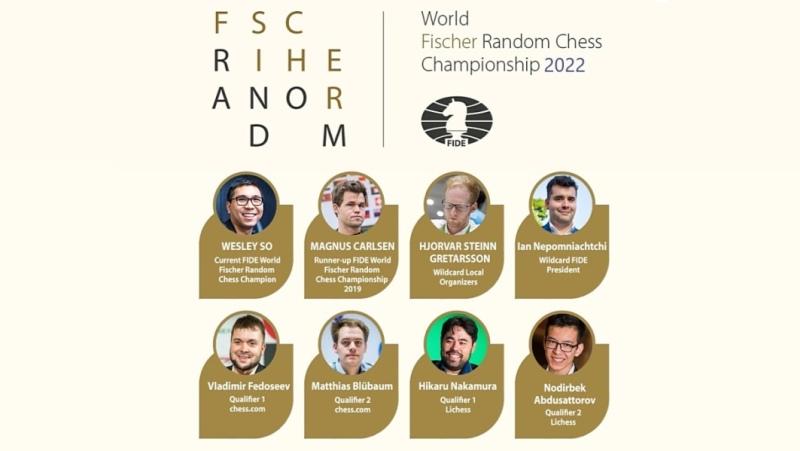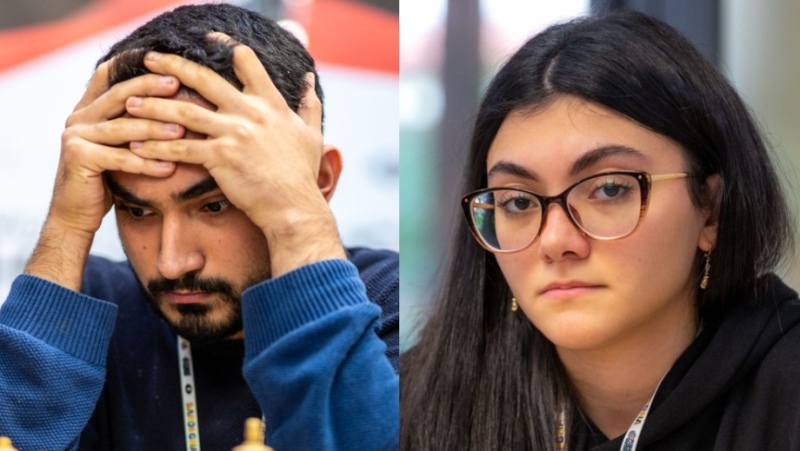Are ready to Random?

By GM Jonathan Tisdall The 2022 FIDE World Fischer Random Chess Championship is about to begin. The event will get its second official edition, this time in Reykjavik from 25-30 October 2022 — 50 years after Iceland’s capital first captured the attention of the classical chess world when it hosted the legendary Fischer-Spassky title match in 1972. The survivors and the seeds The road to Reykjavik has been either gruelling or easy, depending on the route taken. The qualification format is still in its infancy and has tried to strike a balance between being unusually open to the wider chess world than a traditional title cycle while also accommodating seeds and wildcards. The final eight here is the same amount as the traditional chess world’s Candidates Tournament, but there is one less ‘open’ spot since the champion does not sit and wait outside as a ‘final boss’, but joins the quarter-finalists in Fischer Random (FR). The FR titleholder, US Grandmaster (GM) Wesley So, is joined by dethroned runner-up — and classical world champion — Magnus Carlsen. Two players have been granted wildcard berths in the event: local representative and top-rated Icelandic GM Hjörvar Steinn Grétarsson and FIDE presidential pick Ian Nepomniachtchi, two-time classical title challenger and semifinalist in the inaugural FIDE Fischer Random championship in Norway in 2019. Photo: David Llada They will be joined by a quartet that have fought their way here over a horde of online competitors. Two of these — Vladimir Fedoseev and Matthias Blübaum – emerged from the chess.com online site qualifiers, open only to FIDE-titled players. Fedoseev will be a familiar face for Fischer Random fans — an aggressive, creative player, he was eliminated by remorseless champion So in the quarterfinals in 2019. German GM Blübaum is an exciting newcomer to the late stages of this event. The qualifiers held by the online site lichess.org represented the ‘democratic’ format of this particular world championship, with the first stages open to all players, so even those without titles or big credentials could test their skills at this form of the game and dream of adventuring far in the competition. The two winners were, nevertheless, decorated GMs. US GM Hikaru Nakamura is not only one of the best-known players in the world thanks to his popular streaming endeavours, but he is also a Fischer Random shark. When the effort to revive and raise the variant as a serious alternative to the classical game got off the ground in 2018 with an unofficial title match in Norway, Nakamura took on ‘conventional’ world champion Carlsen. Hikaru was chosen based on his 2009 match win over elite GM Levon Aronian, which was the final hurrah of the first series of elite FR events in Mainz, Germany. The other lichess qualifier in Reykjavik is Uzbekistani prodigy Nodirbek Abdusattorov. The just-turned-18-year-old has already managed to acquire an Olympic gold team medal and a World Rapid Chess Championship title for his trophy cabinet. Photo: Lennart Ootes From group to KO The players will be divided into two groups of four, with two advancing from each section, in World Cup football style. The semifinals and finals will be elimination matches, and the final day will also see duels involving all the players to determine each of the prize spots, depending on where they placed earlier. Besides the FIDE world title at stake, the players will be competing for a purse of USD 400,000 and a hefty first prize of $150,000. A return to human combat Historically, interest in playing chess variants with the piece positions shuffled has been fueled by a desire to make a break with charted knowledge in the opening phase of the game. As classical chess has been transformed by the influence of engine power, this long-held fear that the game was being overly worked out has finally become more realistic, with vast amounts of memorized ‘perfection’ beginning to burden top-level chess. The vista of 959 uncharted territories means that Fischer Random more or less erases book learning and that players are on their own from virtually the first move. The starting position will be revealed a scant 15 minutes before the start of play, and the players can consult with one designated human assistant — but no one and nothing else — in the brief intervals before the games begin. This opening clean slate makes Fischer Random hugely appealing to many — maybe most? — elite players who are freed from their usual intense and meticulous levels of preparation and can play with discovery and delight again. Paradoxically, it is often this aspect of the variant that can be an obstacle to acceptance with amateur players, who can feel lost without their favourite openings. In practice, this part of the game can be a great leveller, with stronger players more likely to stray or err early than would ever happen under ‘traditional’ circumstances. It is rare that a Fischer Random game never reverts to looking like ‘chess’, with how, and how long, this process takes being one of the most fascinating aspects of its play. Essential info The games rules are extremely simple: the pieces on the players’ first row are shuffled at random, with two factors kept in mind — the bishops must not be on the same colour square, and there must be a rook on either side of the king, to allow for castling. The rules of castling are the same as classical chess — but it is often the most shocking and eye-catching element of the variant since it usually happens from a very different starting point. For this event, the starting position will be redrawn at random if, by some chance, the classical set-up emerges from among the 960 alternatives. The chief arbiter will be Omar Salama, who has vast experience at major FIDE events, and is also both a FIDE Trainer and International Organizer. The rest of the officiating team are arbiters Shohreh Bayat and Ingibjörg Edda Birgisdottir — the latter will have
Abdulla Gadimbayli and Govhar Beydullayeva win FIDE World Junior Championship

Azerbaijani players rule supreme in the 2022 FIDE World Junior Championship that came to an end in Sardinia. Abdulla Gadimbayli (pictured below) and Govhar Beydullayeva of Azerbaijan took titles in very close competitions in both open and girl sections. The open event was a nail-biter until the very end. Adam Kozak (Hungary) was coming into the final round on 8/10, a half point ahead of Gadimbayli, with as many as nine players trailing the leader by a full point. Abdulla played a very exciting game with his compatriot Mahammad Nuradli that ended in a draw. Francesco Sonis (Italy) and Nikolozi Kacharava (Georgia) scored very important victories and caught up with Gadimbayli. Now all eyes were on the encounter between Leon Luke Mendoza and Adam Kozak (pictured below), in which the Hungarian needed just a draw to clinch the title. However, Adam did not manage to hold an inferior endgame down an exchange playing on a 30-second increment and threw in the towel on the move 83. As a result, five players tied for first place, with Abdulla Gadimbayli claiming gold thanks to slightly better Buchholz (just 0.5 points) over Adam Kozak, who had to settle for silver. The bronze medal goes to Nikolozi Kacharava. Final standings: 1 IM Gadimbayli, Abdulla AZE 2499 8 2 GM Kozak, Adam HUN 2516 8 3 IM Kacharava, Nikolozi GEO 2512 8 4 GM Sonis, Francesco ITA 2531 8 5 GM Mendonca, Leon Luke IND 2558 8 6 GM Esipenko, Andrey FID 2668 7½ 7 GM Nesterov, Arseniy FID 2567 7½ 8 IM Samunenkov, Ihor UKR 2473 7½ 9 GM Petkov, Momchil BUL 2511 7½ 10 IM Davtyan, Artur ARM 2517 7½ Ironically, the leader in the girls section Govhar Beydullayeva (pictured below), also lost her final round game, but it went without consequences as she had a full-point cushion and better tiebreaks (direct encounter win) over her main rival Assel Serikbay from Kazakhstan. Assel did her best, beat Yelyzaveta Hrebenshchykova (Ukraine) and scored equal points with Beydullayeva, but it was only enough for silver. Four players tied for third place, but Meruet Kamalidenova (Kazakhstan) pulled out bronze thanks largely to her last-round victory over the champion. Final standings: 1 WGM Beydullayeva, Govhar AZE 2356 8½ 2 WIM Serikbay, Assel KAZ 2181 8½ 3 WIM Kamalidenova, Meruert KAZ 2376 8 4 WIM Urh, Zala SLO 2221 8 5 FM Jarocka, Liwia POL 2089 8 6 FM Kurmangaliyeva, Liya KAZ 2199 8 7 FM Schulze, Lara GER 2266 7½ 8 IM Salimova, Nurgyul BUL 2415 7 9 Hrebenshchykova, Yelyzaveta UKR 2268 7 10 WFM Hajiyeva, Laman AZE 2138 7 Photo: Przemek Nikiel Official website: fideworldjunior2022.com

